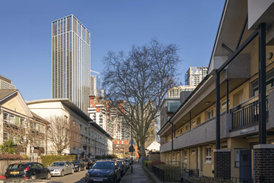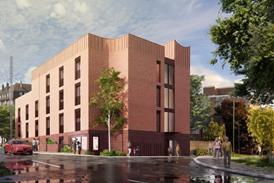Flailing politicians need to grasp the country’s need for a radically new constitutional and architectural settlement, argues Ben Flatman

Once a symbol of stability, Westminster is now reduced to a crumbling stage for Britain’s tawdry constitutional farce.
The sight of the literally crumbling Palace of Westminster cloaked in scaffolding is perhaps an appropriate visual metaphor for the UK’s current constitutional mess. This is the backdrop against which TV reports are filmed for news outlets around the globe. Although this assumes that anyone is still watching or cares about Britain’s strange Brexit meltdown. If even our own politicians and journalists cannot explain what is going on, it’s likely that the rest of the world is equally bemused, or uninterested. Like the palace itself, it feels like our unwritten constitution is in urgent need of an overhaul.
The UK has long seen itself as a place of relative political stability. In the 18th and 19th centuries, Britain looked askance as continental Europe experimented with revolution and republicanism. And in the 20th century we saw ourselves as having steered the world away from the twin perils of fascism and communism. Throughout these periods of immense change, the UK’s political system has evolved incrementally, always maintaining the idea of an unbroken link to the past. And Westminster has often been projected as the built embodiment of this continuity.
There is a lot of truth in the continuity narrative, but we shouldn’t forget the major disruptions and calamities along the way. Britain’s constitution has survived because it is elastic and allows for change when confronted by profound shocks. Brexit feels like one of these. And with all its unintended consequences, it requires a far more radical response than we’ve so far seen from either major party. Both Labour and the Conservatives seem paralysed, unable to grasp the enormity or rise to the challenge of what is happening. We need root and branch reforms, not just to how we’re governed but where we’re governed from.
The Leave result has been blamed on many things, including anti-immigrant sentiment. But the elephant in the room is English nationalism and the parlous state of the English regions. Ever since the creation of the Scottish Parliament and Welsh Assembly in 1998, England has been drifting further towards its current sense of victimhood. Although the West Lothian Question has been partially addressed by the English Votes for English Laws reforms, English government remains subsumed and partially hidden within the UK’s zombie parliament.
Nothing about the current arrangements at Westminster really suits any part of the UK. Scotland and Northern Ireland voted by large majorities to stay in the EU. But our imperfect union allows numerically dominant England to steamroller this massive constitutional change over the other nations. At the same time, the profound challenges facing most parts of England outside the south east are consistently ignored. Perversely, Brexit has only exacerbated the problem. Instead of focusing on the real world problems of Blackpool and Dudley, government fantasises about “Global Britain”, military expansionism and the trade opportunities opened up by chlorinated chicken.
When the first Blair government belatedly set about devolving some of Westminster’s centralised power in the late 1990s, it only did half the job. English government was left unreformed and profoundly detached from the people it was supposed to serve. The consequences have been further decline and disillusionment in England’s regions and the rise of English nationalism. This anger is far more to do with how Britain is governed internally, than the red herring of EU membership.
Have Barry’s building and Pugin’s elaborate interiors contributed to this mess? Men like David Cameron and Boris Johnson have spent their entire lives inhabiting architecture like this. If you’ve been educated at Eton College and Oxford, then it’s easy to see how the move to Westminster must feel like part of a seamless transition. All part of the continuum of British history and empire. But it’s a toxic environment in which to carry out 21st-century government, which has bred complacency and stifled real change.
Like many, I understand the emotional appeal of staying put, and maintaining that Westminster continuity. But the system is broken. The politics and economics of England in particular are dysfunctional and dangerously unbalanced. The sense of stability that Westminster once conveyed has become a liability – providing a veneer of business-as-usual normality to a profoundly divided and discontented union.
It’s time to end the charade. For the sake of all parts of the UK, England needs its own parliament. One that is not hidden away behind the last fraying remnants of a long dead and deeply flawed imperial project, but instead highly visible and rooted in the long-neglected England that exists beyond the M25. It could frankly be anywhere outside of London, but our large regional cities would obviously have the strongest claims. Until we get a radically new constitutional and architectural settlement, the deep divisions and massive economic imbalances will just continue to fester.
Perhaps, as Ed Vaizey suggested this week, there are new uses that could be found for Westminster, including turning parts of it into a museum or hotel. However, there is no need to abandon it completely as a place of government. Assuming that the UK survives the current rupture, a British assembly, with a remit confined to foreign policy and trade, could continue to be based there. This much-reduced assembly might even meet in the Commons. After all, the existing, absurdly small chamber can only accommodate two thirds of the current number of MPs. Surely that’s proof we need change.
















16 Readers' comments